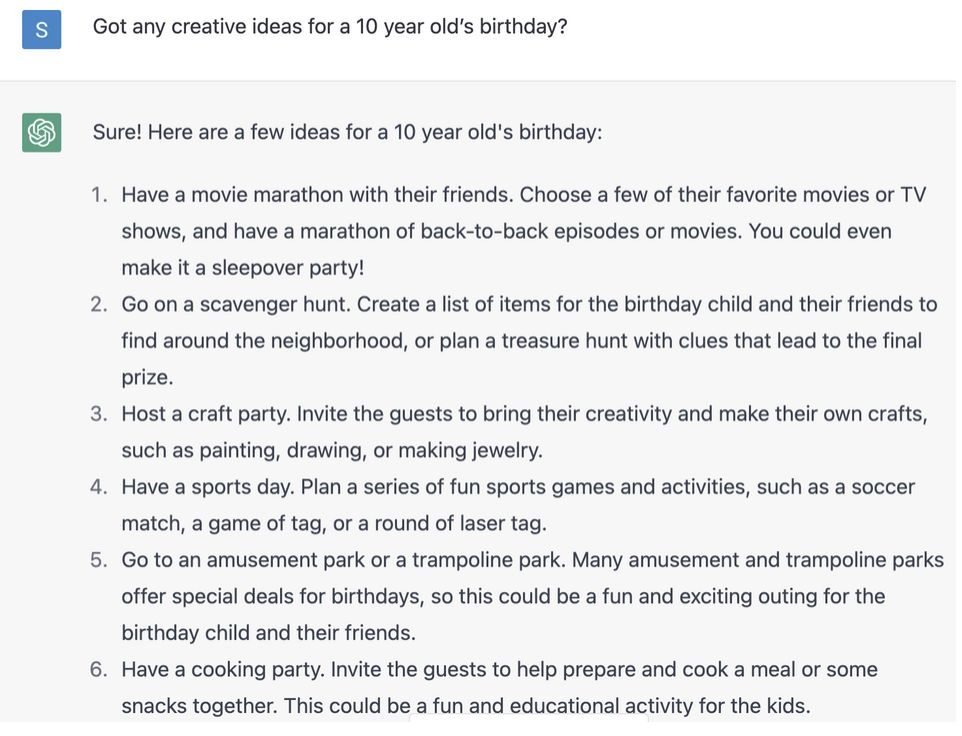For the first time ever, AI has had a “wow!” moment. Everyone - from the general public to longtime AI skeptics - is talking about Generative AI - a type of artificial intelligence that is able to generate new and novel content based on a set of input data. Unlike traditional AI systems, which were great at analyzing and interpreting existing data, generative AI is able to generate new content that is not limited by the data it has been trained on. This allows it to create novel and unexpected outputs, which can be highly valuable in a wide range of applications.
For example, input a text description in plain English and get a completely new, novel image:

Or ask a question/advice in plain English and get really useful recommendations:

Wow!
These amazing new capabilities are being met not just with excitement but with actual users and dollars. After a decade of seeing AI companies struggle to generate even meager revenue, we are now seeing amazing proof points like:
- OpenAI’s ChatGPT reportedly reaches 1M users within 1 week of launching
- Jasper AI goes from ~5M to ~$40M in 18 months and will reportedly do $75M in 2022
- Stable Diffusion reportedly has more than 10 million daily users “across all channels” within 3 months of launching
Generative AI has the potential to revolutionize many industries, from entertainment and media to healthcare and finance. In the entertainment industry, for example, generative AI could be used to create new music, art, and literature. In healthcare, it could be used to develop new drugs or to diagnose and treat diseases. In finance, it could be used to generate new investment ideas or to detect fraud.
Another advantage of generative AI is its ability to learn and adapt over time. By continuously training on new data, generative AI systems can improve their ability to generate accurate and relevant content. This allows them to keep pace with the constantly changing needs of their users, and to evolve and improve over time?
But what’s beyond the cool demos and white hot startup valuations? What are the enduring companies to be built? And if everything is so easy and all the innovation is in the core large language models (LLMs), what is the moat for new startups?
What’s Different This Time
There are 2 key differences between this AI Era and any previous:
- The technology works so well and has been productized so well that anyone can see it’s potential
- There is actual demand to experiment and embrace AI products. 3 yrs ago, I advised AI portcos specifically to NOT mention AI because it scared away customers. This current appetite has resulted in actual users and revenue early for many AI companies
But even more importantly, I believe that we are going through a paradigm shift where the underlying platform for all compute, communications and application development will be completely disrupted and replaced via AI. I predicted this in 2017 but it’s actually happening now. It is possible because we finally have a real, working platform upon which the world can build AI products - Large Language Models (LLMs).
We have seen this happen twice before in the last 25 years with the emergence of the Internet and then Mobile. In each shift, there were 3 phases:
- Emergence of a unifying platform architecture that took roughly a decade to get right
- An explosion of companies that bolted on the new tech to achieve incremental improvement, creating a ton of hype but very few massive new companies
- New category leaders that emerged over time because they exploited the native capabilities of the new tech to build something entirely new

The Coming Decade
We are a decade into the AI paradigm shift, and the foundation layer has finally been built: Large Language Models. The clear winners are Google, Meta, with newcomers OpenAI and Stability AI also likely being successful. There may be room for 1 -2 more players in this layer but this is like the mobile phone wars of the mid-2000s where everyone wanted to build a phone and OS (Microsoft, RIM, Apple, Google) but only 2 standards prevailed: ios and Android.
I view the key new core capabilities of LLMs as follows (with more to emerge, undoubtedly):
- Prediction: what is the next thing (action, step, idea, etc) that should happen based on what has previously happened
- Information retrieval
- Content generation: creating new text, video and images,
- Summarization and synthesis
- Personalization: it will soon be cost effective and entirely possible to build an n of 1 model for everyone in the world for almost everything
We are seeing the first wave of generative AI products taking advantage of some of these capabilities right now. Hundreds of new tools, apps and capabilities are emerging every day by curious and enthusiastic “hackers” who are exploring and experimenting.
While I applaud this wave, I personally have not seen that many products, yet, which are LLM-first i.e. that are taking the opportunity to reimagine what is possible via the lens of LLMs. Usually, it is because they take just 1 of the above capabilities and try to make a tool of out it for a given use case. This is great for automating mundane tasks, enabling higher productivity and accelerating information retrieval to enable humans to focus on making smarter decisions, faster.
But to me, that misses the point about the real new core capability that is emerging with generative AI: agency. An "agent" refers to a system that is able to perceive its environment and take actions that will maximize its chances of achieving its goals. An AI agent can be thought of as a computer program that is able to make decisions and take actions based on its own programming and the data it receives from the environment.
If you put together all 5 of the aforementioned capabilities, you start coming close to AI being able to both make and execute on decisions itself. This doesn’t mean that AI will replace humans. AI agents can operate in solo, or as part of a larger system, and they can be designed to act autonomously or to be controlled by a human.
What it does mean It means that it can truly help us get to a higher level of thinking ourselves.
After all, when I asked ChatGPT about being an agent, it was pretty humble:

For now ….!!!